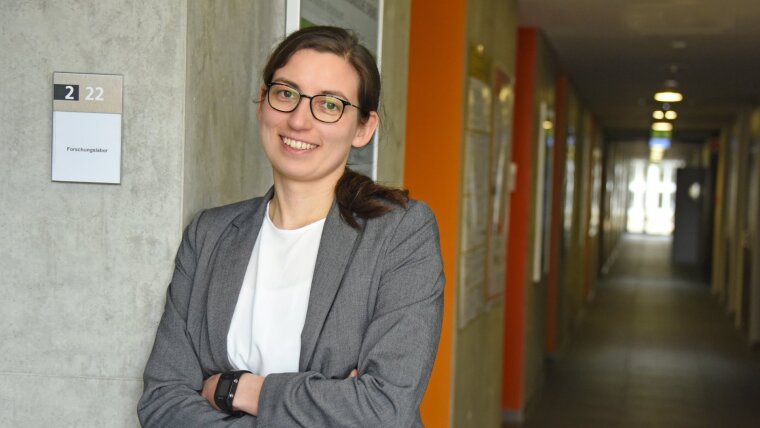
Juniorprof. Dr. Andrea Pannwitz
»Learn and create, transform the future.«
(Native American artist)
Academic Career
2013 · First Degree
University of Göttingen
2017 · Postdoc
Universität Basel, Switzerland
2017 to 2020 · Postdoc
Universiteit Leiden, Netherlands
2020 · Junior Research Group Leader
University of Ulm
2020 bis 2024 · Juniorprofessorship
University of Ulm
2024 · Professorship
Friedrich Schiller University Jena
Interview
What do you like about your work as a researcher? Why did you decide to become a researcher?
I have always been interested in science and really enjoy realizing ideas, designing projects and learning from other scientists. The scientific logic together with the creative elements in project design and science communication, as well as the independence in research are really motivating for me.
Who were/are the role models who influenced your career choice?
My professional role models in science were some of my mentors, as well as many incredibly successful women. Today, I am proud that I have been able to achieve and/or will achieve similar things.
Who or what gave you the most encouragement along your way to achieving your current position? Whose support, or what support, was most important for you?
My network and many of my self-chosen mentors: Very often, I have learned information about evaluation criteria as side info.
Has your career progressed smoothly in a linear way? If not, how have you overcome distractions of obstacles?
I think it has been very straightforward. Of course, I didn't get every research grant or every job I applied for, but I think that's part of the game. In most cases, I applied for the next step in my career earlier than would have been normal. But I wouldn't do it any differently today.
An academic career often seems to be one of great uncertainty. Has this been the case for you?
My sense of adventure was usually greater than my priority for settling. As a compromise for my family life, I looked for a postdoc in Europe, where traveling to my partner (or vice versa) was easier than in North America. For my long-term career, I then focused on professionally and logistically suitable locations in Germany and German-speaking countries where my partner could also imagine living. The logistical aspect of living together was particularly important for the temporary positions where it simply wasn't worth my partner changing jobs. And as I said above, I usually applied early on to see what happened, even if I didn't meet all the criteria yet.
How important is networking to your career? Do you have a particular strategy for networking?
Networking is extremely important and I enjoy doing it because I like to interact with likeable and interesting people. New contacts and interesting conversations often arise at conferences, seminars or other opportunities. For example, if I think someone at a conference is interesting from a professional point of view and/or could be likeable, I seek out the conversation directly or briefly introduce myself. Sometimes we even develop joint projects or objectives later on, but mostly I'm just interested in how they are doing at their research institutions and how things are going at other universities, countries and consortia. In any case, it is usually interesting and also gives me the opportunity to better assess certain people and their ethical values. If I want to strengthen or develop myself in a certain scientific direction, I strategically attend relevant conferences.
How do you manage to balance a demanding career with a private life?
I just do it. Family and friends are most important for me and because everyone is now very far apart, we all travel a lot to see each other. Sometimes one can combine seeing each other with a business trip. It's also important for me to always have sport in my everyday life, either on my own or, even better, together with friends or colleagues.
What tips would you offer young women starting out on an academic career? Could you offer some Dos and Don’ts?
I have sometimes seen really talented scientists reject networking because the term has a certain connotation. But I would advise the opposite, as it is a fantastic way to find supportive peers and have a good time with great people in science.
Do female academics of the University of Jena feel comfortable in their roles? What makes the University of Jena attractive for you?
The University of Jena has great appeal with topics related to light and is super strong in the area of cooperative projects. Both are aspects of research in which I find myself. The central location in Germany is also very nice because we can see family and many friends more often.
Kontakt
07743 Jena Google Maps site planExternal link